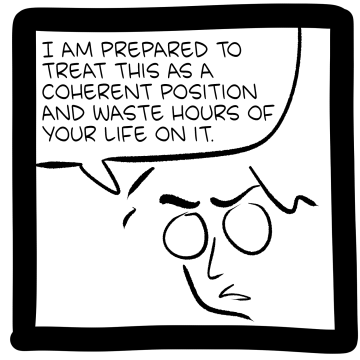Somehow, I can tolerate “jpheg” much easier than the forsaken “jif.”
Jif is where it’s at. Peanut butter and image format? Yes please
But Jif in Australia is a cleaning solution - can we have different pronunciations based on country?
No need, it’s Gif. Heathens be damned.
Y’all love diminutives, call them jiffies?
deleted by creator
Jiffy is already an abstract measurement of time though
The creators literally referenced this early on “choosy devs choose gif” like the jiff peanut butter commercial.
this goes deeper than I thought!
Oh my God no one fucking cares about Steve Wilhite and his fucking speech impediment.
You seem upset.
You don’t pronounce the word for imagery as “jrafics?” How odd.
“Jif” is the original pronunciation. It is a pun, a play on the word “jif” short for “jiffy” meaning a short amount of time, as in “I’ll send it to you in a gif”. The newer pronunciation has become popular based on the fallacious reasoning that an acronym should be pronounced the same as its constituent words, which isn’t a thing at all.
Language evolves, and both pronunciations are common enough to be considered acceptable. The only way to be wrong about how to pronounce the word is to claim one of the pronunciations is wrong.
Become popular? It’s been popular roughly for the lifespan of the format. It’s hardly language’s fault the developer wanted to make an unfunny reference to a since forgotten peanut butter slogan.
On the other hand linguistics indicate a hard g sound with the construction of the word, constituent words aside. Plenty of four letter words starting with the gi combo have a hard g, including but not limited to gift which you may notice is very similarly constructed.
Whatever else the English language may throw at us, people appreciate consistency because we can make some sense of the world. A hard g is the consistent, predictable, sensible choice for the limited availability of those virtues English offers.
It’s been popular in use but casual everyday people weren’t always bringing them up in conversation.
English is not consistent, accept that. You can say gif but I’ll continue to call it gif.
English is not consistent, accept that.
This is the real answer. Both are correct and that’s that. It can be gif as in image, or gif as in graphic.
English is not consistent, accept that. You can say gif but I’ll continue to call it gif.
That doesn’t mean we have an ehxcuse to haje jt worse
I’ve been saying gif with a soft g for over twenty years. Telling me not to is what makes English worse. As far I’m concerned both pronunciations are valid.
Telling me not to is what makes English worse.
In your opinion. “Jiggawatt” is not a common English pronunciation outside of back to the future references at this point. People mostly settled on one over the other because it makes sense to pronounce a word a similar way to be more easily understood. It’s not always the case, sure, but I think you’ll find multiple pronunciations are the exception, not the rule. That’s why you can come up with a good handful of such words, but you’ll be using words with single pronunciations to talk about them.
Become popular? It’s been popular roughly for the lifespan of the format.
I’m gonna stop you there, because I’ve been using the format for about 30 years, and people only started using the new pronunciation in the last 10-15.
Everything you said about linguistics is entirely crap. English is not a proscriptive language. English linguistics doesn’t indicate anything at all. It is descriptive, and is anything but consistent. There are no rules about word construction or pronunciation. Words are pronounced the way they are understood, and if you are understood then you have pronounced them correctly.
You could argue that the original pronunciation is archaic, like “encyclopaedia,” but the problem there is that the word itself is like 35 years old, and there are people like me who have been using the word since there was only one acceptable pronunciation who aren’t likely to change.
people only started using the new pronunciation in the last 10-15.
As someone else pointed out already, this is untrue. While it may not have been popular in your circles, it definitely was in others. I’ve been saying it with a hard g as long as you have with a soft and I’m not the originator either.
English linguistics doesn’t indicate anything at all.
They absolutely do. That’s why you can sound out a word you’ve never seen before. You may not always be right when you do because they indicate, they don’t define.
There are no rules about word construction or pronunciation.
There are, there are just exceptions. For example, an e at the end of the word is silent. I’m certain you can give me a word where it’s not, but there are at least six in this paragraph alone where it is.
if you are understood then you have pronounced them correctly
In this logic if someone has been pronouncing a word all their life with a single pronunciation and travels to another location with a much different accent they can only now be pronouncing the word wrong.
If understanding is also the only metric then a hard g would still be preferable. Not only does a written g tend to make people lean to a hard g in my experience, but there’s more words that could be mistaken for a soft g pronunciation.
You could argue that the original pronunciation is archaic,
Could I not argue that the original pronunciation has fallen out of favor?
the word itself is like 35 years old
Is there a time requirement for pronunciations to become archaic?
since there was only one acceptable pronunciation
Which isn’t a time that existed, as we’ve established
who aren’t likely to change.
Given your stance on language this is absolutely a you problem. If the rest of us collectively decided to understand it as only with a hard g, you would not be understood and therefore be pronouncing it wrong by your own logic.
There are, there are just exceptions. For example, an e at the end of the word is silent. I’m certain you can give me a word where it’s not, but there are at least six in this paragraph alone where it is.
One of the most common words with a final “e” in that paragraph is “the” which not only has a final “e” sound, but has two different final “e” sounds depending on the context: “the end” uses a /ði/ pronunciation but “the word” uses a /ðə/ pronunciation. English is very stupid.
But, I agree with your assessment. English has rules, or at least patterns. “G” is most often hard, not soft, because “J” is available for the soft version, but there’s no alternative for the hard version. English tends to follow patterns, and “gift” has a hard g, and it (and words based on it) are the only ones that start with “gif”, so every “gif” word is hard. Because “t” (unlike “e”) can’t change the sounds before it, the pattern says that “gif” should have a hard “g”.
If it were “gir”, then there would be more debate. The word “giraffe” has a soft “g” but “girl” has a hard one, so the pattern is more muddy.
Also, people who coin words don’t get to decide how they’ll be pronounced. They can certainly try, but they’ll often lose. There are plenty of words in English borrowed from other languages that not only sound nothing like the original language, but that sound nothing like they’d sound if they were English words. For example, “lingerie”. It’s a French word, but the English pronunciation sounds nothing like a French word. In fact, if someone just sounded out the word as if it were an English word, they’d probably get much closer to the French pronunciation than the awful “lawn-je-ray” which is the current accepted English pronunciation (though, they’d probably assume a hard “g” sound).
In this case, it’s too bad that Steve Wilhite didn’t have a background in linguistics or he would have realized that people would see “gif” and assume a hard “g”. It was a losing fight from the start because he either didn’t understand the assumptions people would have when they saw those letters, or he thought that somehow he could successfully fight the tide all by himself.
I’ve never had the problem of not being understood. And regardless of how long the time period was, there was a time when one guy spoke aloud the word when he invented it. You can use the new pronunciation if you like, but I use the original, as I have for 30+ years, and I will continue to do so because both are acceptable. If you don’t like it, that’s a you problem.
I’ve never had the problem of not being understood.
You are either a uniquely spectacular communicator or a liar. It’s not for me to say which. Regardless that’s not the point. If you use the soft g sound and are not understood then, by your own explanation you are saying it wrong. That’s something you need to contend with.
And regardless of how long the time period was
So no time requirement on archaic then?
there was a time when one guy spoke aloud the word when he invented it.
As is true of every word and yet I’m sure there are words you say differently than the first person. I’ll bet you don’t say the name of the element with the atomic number 13 the same way the man who discovered it does. Not to mention who knows how many words England took from France, mangled, and then got adjusted again in America. Who is the correct first person there, or does the first person only matter with this specific issue?
You can use the new pronunciation
I will as well many others.
as I have for 30+ years,
Me too! Still doesn’t make yours right and mine wrong no matter how hard you try to deride it as “new” when it’s barely newer than the format.
and I will continue to do so
I can’t stop you. I can think you ridiculous for doing so but my suspicion that this would be the only reason I would think that of you diminishes with each response you send.
both are acceptable
Perhaps, but one seems to be falling out of favor. Just like a double space after a period or writing out words greater than ten but less than one hundred.
I could call it a moving picture and not be wrong, doesn’t mean people wouldn’t think me weird for doing so. I would have to deal with that the way you need to deal with what your choices cause people to think of you.
If you don’t like it, that’s a you problem.
Sure, but it won’t stop me from making my own conclusions just like any other thing. The same is true for all of humanity to varying degrees.
I’m gonna stop you there, because I’ve been using the format for about 30 years, and people only started using the new pronunciation in the last 10-15.
I’ve been using the word since the mid 90s and it’s always been hard G for me.
I don’t say that to suggest that you or anyone else are wrong to say it with a soft G (although my brain cringes each time I hear it), but since I don’t think I invented the hard G pronunciation I think claiming it’s a recent thing is a fallacious argument against the hard G.
Nobody invented the mispronunciations, it just happens, which is why the manual included a guide. The inventor of the word (and the format) had to tell people how it was pronounced and why he chose the name, just like every other brand name.
What is recent is the fallacious arguments related to how acronyms are supposed to be pronounced, part of a larger trend towards obstinate and belligerent defense of an objectively and demonstrably false argument. The internet has made people feel like their opinions are just as valid as facts.
In the 90s, we nerds used technical terms like a shiboleth to separate other nerds from what the French call “les incompétents.” But it’s unlikely anyone would have corrected you back then, because doing so was considered impolite and elitist.
I see it as part of what Colbert called “truthiness.” There is no rule for how the word should be pronounced, but it feels like there should be, which is why the argument is so often repeated. The feeling of being right is more important than the reality of ambiguity, and people seek out validation of their presuppositions. It’s that overconfidence that fosters animosity towards debate, which is why people get so heated about silly things like this.
This is my only point:
I think claiming it’s a recent thing is a fallacious argument against the hard G.
Jift.
It’s Gif and I don’t care what anyone says
Oh yeah well I say drink more Ovaltine
Why do they call it Ovaltine? The container is round. The mug is round. They should call it Roundtine.
I don’t care either. Now excuse me while I go gerk off.
Dijusting.
It’s pronounced like yiff. I have spoken.
Great, now search for communities with ‘yiff’ here on lemmy.
That’s a fantastic idea ;P
Still kicking myself for joining Pawb and not Yiffit <.<
Git is now pronounced Jit.
JIT, as in the compiler architecture, is now pronounced Git.
It’s pronounced with a hard J because a soft GIF is just the post deed version of GILF…
If you have to spell it wrong to show how you pronounce it that should be a sighn
It’s pronounced Gif, with a soft G as in Graphics.
I don’t give a fuck what the idiot creator thinks it should be pronounced as, I’ll die on this hill with my honor intact, surrounded by the corpses of everyone who thinks Jif is referring to anything but peanut butter.
You say soft g when you mean hard g. Hard g’s include GOAT, game, dragon, and gangster. And gif.
It’s pronounced jif because jraphics are his phavorite.
Jif is a cleaning product
Guys… guys… can we all just agree that it’s pronounced gif and not gif?
The J is pronounced like the J in Jesus (Spanish pronunciation)
👋 feg
no need to be homophobic
All of this could be solved if English weren’t a shit language with incoherent phonemes.
All this could be solved if people would accept that English changes over time and if defined by usage and understanding.
If people easily understand what I mean when I say gif then I have pronounced it correctly. Same as if people understand what I mean if I use “literally” to mean “figuratively” or spell “island” with an ‘s’ despite it having no Latin roots.
And if u spel werds liek this and r stil understud is it kerect?
If it impedes understanding and causes to person you’re talking to take more time and/or effort to understand the message you are trying to convey then it is incorrect.
So r u saying that writing “are” and “you” that way is correct? Because I’m pretty sure it doesn’t impede understanding in the slightest.
Coming from the jif camp myself, I’d just like to point out it’s jay-phej.
Say gift. Now what you’re going to do next is leave out the T but enunciate the gif part the same way. Fuck you jif people!
I’ll tell the agile fragile fugitive gin-drinking giraffes eating ginger ginseng to imagine gingerly using their digits to engineer a geological survey of the gist of your comment. They ate too much gingerbread and now have gingivitis, so the margins of those attracted to religion aren’t as rigid as the original origins of those of that region and we have to remain vigilant lest magic supersede logic, which of course would be terrible for legislation of the legions.
That’s how you do it, boys and jirls
GIF is pronounced GIF not because the G stands for Graphical, but because it is its essence. It is what is calls out to be… Called.
And because it’s not peanut butter.
And for the same reason, JPEG is pronounced JFEG not because the P stands for Photographic, but because that is the expression of its true essence.
I just didn’t know it before today.
Justice for JΦEG!
Also, “gi” in english makes the hard g sound very often, like in gift, or give, or giddy. You need to do some real mental gymnastics to justify it as a j sound
The giant ginger biologist originally apologized for being allergic to ginseng.
giant, gigantic, ginger, gist, gin, giraffe, gibberish, gingivitis, giblet, giro, giron, gingal, gipsy / gitano, gingili, gigot, girasole, giaour, …
logic, tragic, agile, agism/aging, legit, sigil, magi, magic, argil, algid, aegis, vagile, algin, digit, legible, legislature, surgical, intellegible, …
looks like a lot of palatal affricates to me dawg idk, i think you’re the one doing mental gymnastics trying to justify it not being pronounced the way the creator specified. “gif” the way you ask for just sounds weird
Say the word “gift”. Don’t pronounce the t. Wow. That simple.
Say the word “giraffe”. Don’t pronounce the ra. Wow. That simple.
Not sure if the use of the word “gymnastics” is intentional here
I’m not taking about gy or ge, I’m talking about gi
What about gin?
Sure, I’ll have some.
We should just go ahead and pronounce all acronyms the way their unabbreviated forms’ first syllable letters are said. Just ignore we treat individual letters differently than the words they came from.
The CIA should sound like “see ya” Department of Transportation “Duht” Internal Revenue Service “ears”
Etc.
I would suggest the tax guys be pronounced ire’s. The raise my ire anyway.
Dept of Transportation would be “dot”, no?
Helen wears socks and sandals, and has divergent opinions. Helen needs to disappear in a landfill. Dispatching a team.
I’m definitely not taking any lessons from someone who wears socks with sandals no matter their credentials.
As a German, I feel personally attacked by this.
Helen is wearing socks with sandals. Helen don’t give a single phuck.
Why use C and K in socks when they are pronounced the same?
New spelling: Sokks
Nah, gotta go with soks - can’t have that redundant k in there!
Yup. Don’t want to risk a third K getting in there…
Socc is the correct spelling now, because its “soccer” not Sokker (or Soker).
This is a hill I am willing to die on.
Language evolves over time to become shortened for convenience.
Therefore sox is now the correct spelling. You all are using archaic spelling variations. Sox is always plural. I’m sure this will cause no confusion.
On a less anarchist note, spelling wasn’t standardized until the early 1900s.
So up until then, sox, soccs, socs, sokks, soks, and socks were all valid ways to refer to foot panties.
Foot panties!! This is now canon, someone call Merriam-Webster!
Foot condom
It’s obviously “sox”.
Sahks



























